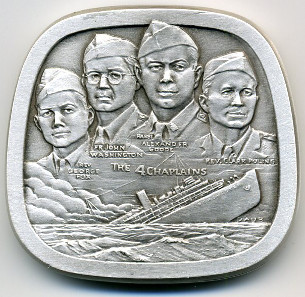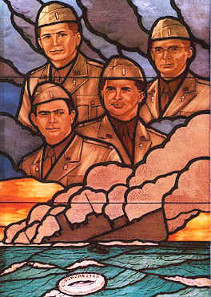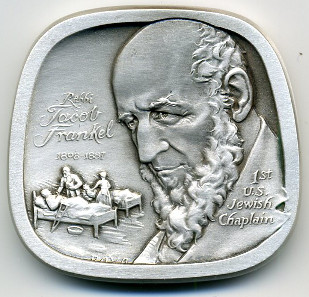July 31, 2014 – The Jewish-American Hall of Fame produces the longest continuing series of art medals in America, launched in 1969. Its 2014 medal, honoring United States Jewish Chaplains, features Rabbi Alexander Goode, along with the other Immortal Four Chaplains, and Rabbi Jacob Frankel, the first U.S. Jewish Chaplain. The medal is designed by Eugene Daub, who has designed 7 of the last 8 medals in this long-running series.
Rabbi Alexander Goode (1911-1943), One of the Immortal Four Chaplains./ courtesy of designer Eugene Daub.
There are many stories of bravery among the American Military during World War II, but few have captured the imagination and admiration of Americans more than the Four Chaplains. After the attack on Pearl Harbor in 1941, Rabbi Alexander Goode applied to the Army, receiving his appointment as a chaplain on July 21, 1942. Chaplain Goode went on active duty on August 9, 1942. In October 1942, Goode was transferred to Camp Myles Standish in Taunton, Massachusetts and reunited with Chaplains John Washington, a Catholic priest; Clark Poling, a Dutch Reformed minister; and George Fox, a Methodist minister—all of whom were Goode’s classmates at Harvard.
Even the U.S. Pentagon has a stained glass window depicting the Four Chaplains./ Source: Wikicommons.
The Dorchester left New York on January 23, 1943, en route to Greenland, carrying the four chaplains and approximately 900 others, as part of a convoy of three ships. During the early morning hours of February 3, 1943, at 12:55 a.m., the vessel was torpedoed by a German submarine off Newfoundland in the North Atlantic. The torpedo knocked out the Dorchester’s electrical system, leaving the ship dark. Panic set in among the men on board, many of them trapped below decks. The chaplains sought to calm the men and organize an orderly evacuation of the ship. As life jackets were passed out to the men, the supply ran out. The chaplains removed their own life jackets and gave them to others. They also helped as many men as they could into lifeboats, and then linked arms and, saying prayers and singing hymns, went down with the ship.
Rabbi Jacob Frankel (1808-1887), the First U.S. Jewish Chaplain./ courtesy of designer Eugene Daub.
At the outbreak of the Civil War, Jews could not serve as chaplains in the U.S. armed forces. When the war commenced in 1861, Jews enlisted in both the Union and Confederate armies. The Northern Congress adopted a bill in July of 1861 that permitted each regiment’s commander, on a vote of his field officers, to appoint a regimental chaplain so long as he was “a regularly ordained minister of some Christian denomination.”
However, on July 17, 1862, Congress adopted President Lincoln’s proposed amendments to the chaplaincy law to allow “the appointment of brigade chaplains of the Catholic, Protestant and Jewish religions.”
Almost as soon as the law changed, the Board of Ministers of the Hebrew Congregations of Philadelphia requested a Jewish hospital chaplain. Jacob Frankel’s fellow clergymen nominated the popular rabbi, nicknamed the “sweet singer of Israel,” and Lincoln signed the commission on Sep. 18, 1862. For three years, he acted as Army chaplain, singing, chanting, and praying with hospitalized and other soldiers.
Issued in very small limited editions, these approximately 2-inch, 3 oz. art medals are available on a first come-first served basis in bronze (maximum of 150 pieces) for $45, pure silver (maximum of 85) for $200, and gold-plated pure silver (maximum of 35) for $250.
Orders should be sent to the non-profit Jewish-American Hall of Fame, 5189 Jeffdale Ave., Woodland Hills, CA 91364, or email directorjahf@yahoo.com.
Mention that you read about this medal in CoinsWeekly and you can take 20% discount.
Other medals and the whole virtual Jewish-American Hall of Fame you will find here.






